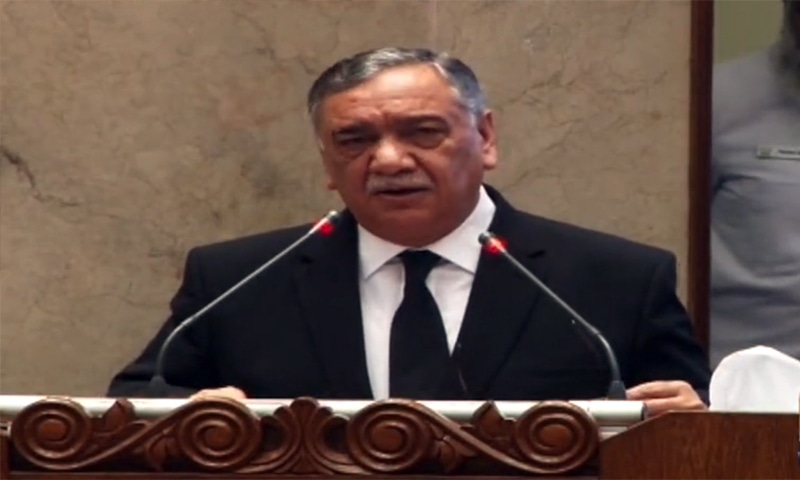Government allowed Nawaz to travel abroad, not judiciary: CJP Khosa says
Chief Justice of Pakistan Asif Saeed Khosa on Wednesday responded to recent remarks by Prime Minister Imran Khan regarding the judiciary, saying it was the government that allowed former prime minister Nawaz Sharif to travel abroad for medical treatment.
“Do not taunt us regarding the powerful,” the chief justice said, adding that everyone is equal before the law. He was speaking at the inauguration ceremony of a mobile app, call centre, complete video link facility in five courtrooms of the Supreme Court, research centre and an enhanced website to facilitate litigants and lawyer.
He said the permission to go abroad was granted to Nawaz by the prime minister and the Lahore High Court (LHC) had only set the modalities.
While speaking at a ceremony in Havelian on Monday, Prime Minister Imran had asked Chief Justice Khosa and puisne judge of the Supreme Court Justice Gulzar Ahmed to come forward and restore public confidence in the judiciary
In his address, the premier had also said that speedy and quick justice for all would lay the foundation of the country’s new system based on the principles of ‘Riasat-i-Madina’. He said there was a perceived disparity in how the powerful and common people were treated in the country’s judicial system. He added he was ready to support the judiciary to change the perception and restore public confidence in the institutions.
“Whatever social segments criticise our judges should be a little cautious because they (judges) are working hard day and night,” Chief Justice Khosa said. “Encourage them rather than criticising them”.
He said the only powerful element in the eyes of the judiciary is the law and not any individual. “I don’t want to comment on the particular case the respected premier referred to, but he would know that he himself gave the permission for someone to go abroad. The debate in the high court was on the modalities,” the top judge said, referring to the one-time permission granted to Nawaz to travel abroad.
“A silent revolution has come in our judiciary,” Justice Khosa said, while acknowledging that no institution is “perfect”.He also added: “Do not compare us to the judiciary that existed before 2009; the judiciary after that year is different, independent. For us, no one is big, small or powerful.
“Do you not remember that we convicted a prime minister (Nawaz Sharif) and disqualified another prime minister (Yousuf Raza Gilani)?” Chief Justice Khosa said, and while raising both his fists in a similar fashion as done by former president retired Gen Pervez Musharraf on May 12, 2007, added: “The case concerning a chief of army staff is going to be decided soon”.
The chief justice welcomed Prime Minister Imran’s announcement that he would divert resources from other departments to the judiciary to improve its functioning. He said the judiciary was now feeling a dearth of resources and so the premier’s announcement is “very timely”.
He highlighted that a total of 3,100 judges and magistrates had decided 3.6 million cases last year. And except for one or two, all of the litigants who were given relief by the judiciary belonged to the weak and downtrodden classes, he added.
Justice Khosa said if a certain individual gets a lot of projection in the media, it should not be taken to mean that the 3.6m other people whose cases were decided by the judiciary should be forgotten.
“To say that there is some imbalance [in how the powerful and the weak are treated by the judiciary] … it should be reconsidered,” he stressed.
He said using its current resources, the judiciary has ended the 25-year backlog of criminal appeals in the Supreme Court while, thanks to model courts, no murder trial is pending in 17 districts of the country.
The judges are burning their midnight oil with no extra expense. We did not ask the government for a penny. […] We did not ask the parliament for any amendment to laws or additional budgetary allocation”.


Comments are closed.